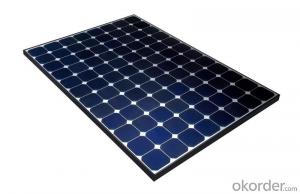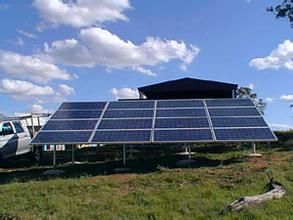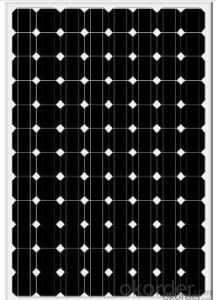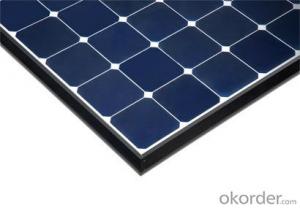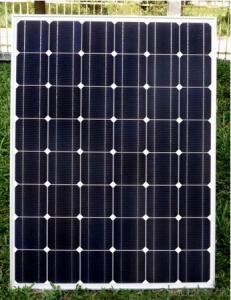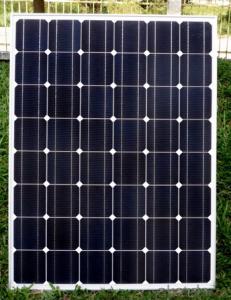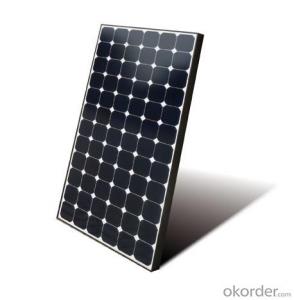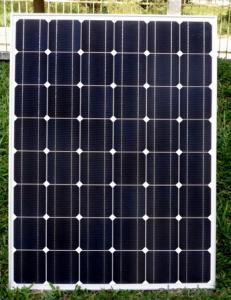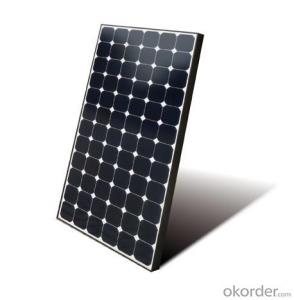Würth Solar Panels - Mono Solar Panel 35W A Grade with Cheapest Price
- Loading Port:
- Tianjin
- Payment Terms:
- TT OR LC
- Min Order Qty:
- 100 watt
- Supply Capability:
- 1000 watt/month
OKorder Service Pledge
OKorder Financial Service
You Might Also Like
Specification
Mono Solar Panel 35W A Grade with Cheapest Price
product description
Solar cells are described as being photovoltaic irrespective of whether the source is sunlight or an artificial light. They are used as a photodetector (for example infrared detectors), detecting light or other electromagnetic radiation near the visible range, or measuring light intensity.
In contrast, a solar thermal collector supplies heat by absorbing sunlight, for the purpose of either direct heating or indirect electrical power generation from heat. A "photoelectrolytic cell" (photoelectrochemical cell), on the other hand, refers either to a type of photovoltaic cell (like that developed by Edmond Becquerel and modern dye-sensitized solar cells), or to a device that splits water directly into hydrogen and oxygen using only solar illumination.
Multiple solar cells in an integrated group, all oriented in one plane, constitute a solar photovoltaic panel or solar photovoltaic module. Photovoltaic modules often have a sheet of glass on the sun-facing side, allowing light to pass while protecting the semiconductor wafers. Solar cells are usually connected in series and parallel circuits or series in modules, creating an additive voltage. Connecting cells in parallel yields a higher current; however, problems such as shadow effects can shut down the weaker (less illuminated) parallel string (a number of series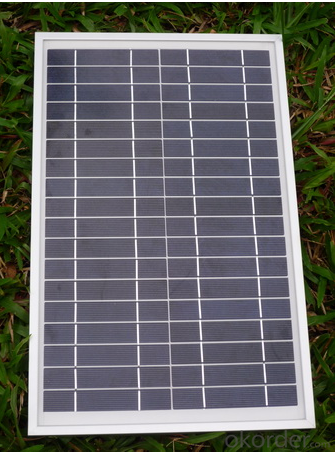
Feature
The modules use high-quality imported polycrystalline or Polycrystalline solar panel;
Enclosed by high-rigidity tempered glass, with excellent light transmittance and output performance;
Surface treated with reflection-reducing process, increasing the light absorption.
Back sealed with anti-aging EVA, resistant from moisture and corrosion.
The efficiency of our Polycrystalline solar cell is over 17%, and polycrystalline panel is over 16%. We stipulate, the allowance of each panel’s rated power has to be positive. Each panel is strictly tested before leaving the factory.
Our solar panel is designed with a lifetime of 25 years, and guaranteed that the power decline less than 10% within 10 years, and 20% within 20 years.
Packaging
28pcs into one box 48pcs into one pallet.
Delivery
20 days after received full payment
Payment term
LC&TT
- Q: Does the new horizons has a solar panel for it power resources instead using nuclear generator?
- No solar panel, and for the reason you stated - it is so far from the Sun that a solar panel would be of little use (and a lot of extra weight) at the distances where the primary part of the mission was being performed. The power source is called an RTG. We can think of it as similar to a nuclear-powered battery or a miniature nuclear power plant. As far as I know it is not intended to reach any other star. If it does, it's power will have long since depleted - and it would take thousands of years at its current speed to reach even the closest star. Closest star: Proxima Centauri, slightly more than 4 light years away. Current speed of New Horizons relative to the Sun: 4.52 km/s That's 0.000048 of the speed of light. It would take more than 20,000 years to reach Proxima Centauri *if* it were heading in that direction (which it is not).
- Q: I am curious about how much of the energy that a solar panel of a given size and capacity will produce in it's lifetime, and what fraction of that energy was required to produce it in the first place?
- The attached link is to an article from the 200 Home Power magazine. In that article the energy payback was found to be between 2 and 4 years. Newer panels are more efficient primarily because the silicon wafers used today are thinner. The silicon cell embodies most of the energy required to make a solar panel. Today most solar panels will produce the amount of energy required to manufacture them in between about 9 months and 2 years depending upon the specific technology used to make it. Solar panels are expected to produce energy for between 30 and 50 years. Therefore it takes around 5% of their total energy production to produce them. Note that these figures depend upon where the panels are installed. Panels in very sunny areas may generate more than 3 times the energy of panels in a cloudier area. Edit - The energy payback meta-study that carbonates references below mention one particular study Alsema (2000), which the authors used as a baseline to come up with their 4 year payback figure. These studies DO NOT assume ideal conditions. The Alsema study assumes an annual an irradiation of 700 kWh/m2/yr. That is the United States average irradiation and does take into account cloudy weather and the like. Under idea conditions the amount of energy collected can be almost twice as much. Albuquerque New Mexico is an example. The figures I mentioned above are recent values reported by several different panel manufacturers with whom I discussed the issue at the 2006 IEEE 4th World Conference on Photovoltaic Energy Conversion held this May. The very long payback times that carbonate highlights are almost certainly wrong. The study he references concludes that paybacks range between 2 and 8 years with 4 years being the most likely. In my opinion payback times are actually a fair bit shorter based on conversations with the manufacturers.
- Q: I am completely ignorant on this subject. I was just wondering out of curiosity of how many solar panels and equipment that it would take to run a central ac for a 2500 sq ft home and a pump for a medium sized pool. I'm talking running ac for like 8 hours a day to keep around 65-70 degrees and running the pump 24/7. Just looking for a general ballpark answer.
- Solar panels are not going to be able to run a pool pump 24/7. They will only produce their rated electricity for 4 to 8 hours a day. For the balance you will need a grid connection or a battery backup. Running the AC would require different power levels depending upon humidity, outside temperature levels, solar gain for the house, and insulation levels. An underground house in Maine will be much easier to AC than a Glass house in Arizona. First find the power requirements. If you had the existing equipment they will have a label with the power requirements or the minimum breaker required if nothing else. For example the pool pump may require a 0 amp 240 breaker while the AC may require a 30 amp 240 breaker. That would be 2400 watts for the pump and (30 x 240) 7200 watts for the AC or a total of 9.6kW each hour of operation. (max) You will next need to find the rated capacity of the solar panels. If each panel were rated at 300 watts then you would need 32 panels for the daytime use and perhaps more to fill in a battery backup. All the numbers are very rough estimates.
- Q: How do solar panels affect the roof's lifespan?
- Solar panels can actually extend the lifespan of a roof. They act as a protective layer, shielding the roof from the elements, such as UV rays, rain, and snow. This helps to prevent damage and deterioration, ultimately increasing the roof's longevity.
- Q: I want to use this solar panel to hook up AC adapters. IM not sure what to do and how to use the solar panel. I want to be able to use a batter charger, a radio, and charge a GPS if needed. - Thanks, Zoo
- Most radio's have a DC plugin port. You can build or purchase adapters that step down the 2 V power to the radio's power needs. In short, power your devices directly from the solar cell using the car adapter plugs made for them or charge a larger battery as a power resevoir and plug your car adapters into it when it is dark which allows you to charge devices when you are not using them while sleeping.
- Q: Can solar panels be installed on swimming pools?
- Yes, solar panels can be installed on swimming pools. Solar panels can help to power pool pumps, heaters, and other equipment, reducing energy costs and making pools more energy-efficient.
- Q: I have a solar panel, charge regulator, inverter....is that all I need to tie it into my grid? Do I just plug the solar panel into the charge regulator into the inverter into any 0v outlet? I feel like im missing something....
- No don't do that unless you want a fire or worse electricution . DO NOT PLUG INTO THE WALL . st solar panel 2nd regulator 3rd 2 volt battery 4th inverter . The inverter should have 0 volt terminals that look like the plug on the wall . You would plug your TV or light into that the inverter . You would need an electrition to hook into your home electrical system . They will hook up a device made to tie into the grid or your meter that will make it run backwards but it takes alot of solar panels too do that . Please do not plug into wall .
- Q: i want to build a stationary model of a solar panel and i dont know if it is going to be too simple or not i also want ideas to make it betterplease criticism is allowedmy idea was to make a case, just like a real solar panel, and take plexiglass to make it. i want to add some models of photovoltaic cells that look like they are in a solar panel . i want to add the fake shoulderings as well . i want to make the case openable by hinges.i would like some of your thoughts and ideas to help me .thx
- The okorder /
- Q: Can solar panels be installed on a shipping container?
- Yes, solar panels can be installed on a shipping container. In fact, many people and businesses are now utilizing shipping containers as a platform for solar installations due to their portability and ease of installation.
- Q: How can I know the right type of solar panel to choose for my small village house in Africa?
- The power output of a solar panel uses a formula to determine kilowatts produced per hour per square meter per day. This calculation is important because, if you plan to install a solar power system for your home, you will want to know how many solar panels will be needed. To calculate solar power requirements correctly, you need to gather the data that is needed for the calculation. First you have to find the average amount of solar radiation available for your area. You can use a solar radiation chart. This can range from a 4 to a 7 depending on the area you live in. Write the number down on a piece of paper and indicate it with the letters RA. Next is determine the amount of electricity that you use daily. Add the kilowatt-hours used per month from your utility bill. Multiply this number by ,000 to get the watt hours in a month. Divide the total by 30 for the amount of electricity you use daily. Write this number down and indicate it with the letters DE. Determine the percentage of your home that you want to power with the solar power system. Write this number down and indicate it with the letter P. Determine the system inefficiency factor for the solar power system. You should be able to find this on the brochure for the system or from the manufacturer's web site. Write this number down and indicate it by the letter I. Determine the power or yield that is required for your home. Use the equation P = I x (DE x P) / RA to find the power requirements in kWh. Divide the number from Step 5 by the peak wattage for a single solar panel to determine the number of panels you will need for your home. Goodluck! :)
Send your message to us
Würth Solar Panels - Mono Solar Panel 35W A Grade with Cheapest Price
- Loading Port:
- Tianjin
- Payment Terms:
- TT OR LC
- Min Order Qty:
- 100 watt
- Supply Capability:
- 1000 watt/month
OKorder Service Pledge
OKorder Financial Service
Similar products
Hot products
Hot Searches
Related keywords
